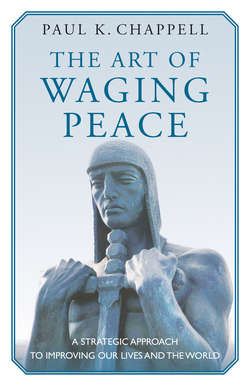Читать книгу The Art of Waging Peace - Paul K. Chappell - Страница 6
На сайте Литреса книга снята с продажи.
PROPHETS OF PEACE: GENERAL DOUGLAS MACARTHUR SPEAKING ON THE NEED TO ABOLISH WAR
ОглавлениеThe leaders are the laggards. The disease of power seems to confuse and befuddle them . . . They debate and turmoil over a hundred issues—they bring us to the verge of despair or raise our hopes to utopian heights over the corollary misunderstandings that stem from the threat of war—but never in the chancelleries of the world or the halls of the United Nations is the real problem raised. Never do they dare to state the bald truth, that the next great advance in the evolution of civilization cannot take place until war is abolished . . .
I am sure that every pundit in the world, every cynic and hypocrite, every paid brain washer, every egotist, every troublemaker, and many others of entirely different mold, will tell you with mockery and ridicule that [the abolition of war] can be only a dream—that it is but the vague imaginings of a visionary. But, as David Lloyd George once said in Commons at the crisis of the First World War, “We must go on or we will go under.” And the great criticism we can make of the world’s leaders is their lack of a plan which will enable us “to go on.” All they propose merely gravitates around but dares not face the real problem. They increase preparedness [for war] by alliances, by distributing resources throughout the world, by feverish activity in developing new and deadlier weapons . . . We are told that this increases the chances of peace—which is doubtful—and increases the chances of victory if war comes—which would be incontestable if the other side did not increase in like proportion. Actually, the truth is that the relative strengths of the two change little with the years. Action by one is promptly matched by reaction from the other . . .
I recall so vividly this problem when it faced the Japanese in their new Constitution. They are realists; and they are the only ones that know by dread experience the fearful effect of mass annihilation. They realize in their limited geographical area, caught up as a sort of no man’s land between two great ideologies, that to engage in another war, whether on the winning or the losing side, would spell the probable doom of their race. And their wise old Prime Minister, Shidehara, came to me and urged that to save themselves they should abolish war as an international instrument. When I agreed, he turned to me and said, “The world will laugh and mock us as impractical visionaries, but a hundred years from now we will be called prophets.”
Sooner or later the world, if it is to survive, must reach this decision. The only question is, When? Must we fight again before we learn? When will some great figure in power have sufficient imagination and moral courage to translate this universal wish—which is rapidly becoming a universal necessity—into actuality? We are in a new era. The old methods and solutions no longer suffice. We must have new thoughts, new ideas, new concepts, just as did our venerated forefathers when they faced a new world. We must break out of the straitjacket of the past. There must always be one to lead, and we should be that one. We should now proclaim our readiness to abolish war in concert with the great powers of the world. The result would be magical.*
